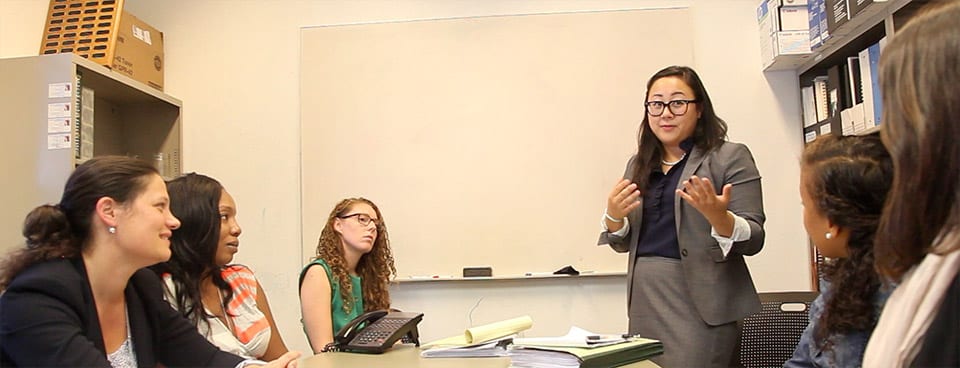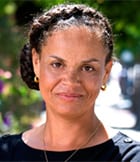
By Andrew Cohen
The news of unarmed African Americans being killed by white police officers in Ferguson, Staten Island, and elsewhere triggered reflection—and action—at Berkeley Law.
In February, Dean Sujit Choudhry formed a working group to identify initiatives the school could pursue to explore criminal, social, and racial justice issues surfaced by the killings. Faculty, staff, and students participated in discussions over several months, and the law school is starting to implement some recommendations.
Working group sub-committees examined three main areas: the creation of an information hub on race and criminal justice, potential changes to the first-year curriculum, and experiential learning opportunities.
For the information hub, the school recently launched a website for faculty research and student opportunities to work on questions of race and criminal justice. It includes a new Web portal—which Professor Justin McCrary helped build for the California Attorney General—with extensive information on arrests, violence against police, and deaths in police custody.
The curriculum subcommittee probed Berkeley Law’s first-year course offerings to see if adjustments should be made to expand coverage of pressing social justice questions. The full committee is reviewing the report and will decide whether to propose changes after extensive faculty consultation.

The Experiential Education/Community Service Subcommittee, chaired by East Bay Community Law Center (EBCLC) Executive Director Tirien Steinbach ’99, explored new opportunities related to issues such as police accountability, the school-to-prison pipeline, and the use of fines and fees to impoverish and criminalize African Americans and the poor.
“We want our approach to establish best practices,” Steinbach said. “How are we serving demonstrated community needs around racial justice and specifically criminalization of African Americans? How can we build on Berkeley Law’s strengths? We’re focused on multi-pronged projects with a direct services component and an achievable policy agenda for systemic change.”
After considerable research and discussion with community members, police, and groups at other law schools, four projects were proposed.
Seeking true juvenile justice
The first—the Initiative to End Racial and Economic Disparities in Juvenile Justice—is underway. It focuses on the collateral consequences of harsh school discipline policies and juvenile court debt. EBCLC’s Youth Defender Clinic (YDC) and the Policy Advocacy Clinic (PAC) lead this effort on issues that Steinbach said “keep poor youth of color in a perpetual cycle of marginalization and criminalization.”
The project’s first prong tackles the societal and economic costs of criminalizing African American and Latino youth in middle and high schools through expulsion and arrests—and the imposition of excessive court-ordered fees and monitoring. It seeks to decriminalize school discipline in Berkeley and Oakland and create a model for other school districts seeking to reduce racial disparities in punishment.
When examining the experience of young people of color in schools and courts, Steinbach said “the distrust and disconnect between their communities and the criminal justice system comes into sharp focus.”
YDC will challenge the use of expulsions in school discipline cases, highlight their racial disparities, and encourage alternatives. It will also represent youth in individual cases and related proceedings. In addition, Berkeley Law will offer free trainings on the juvenile justice system for school administrators and teachers; communicate with police, probation district attorneys, and public defenders; and convene presentations and a conference on policing in schools.
The project’s second prong seeks to reform the imposition of juvenile court fees and restitution orders that push poor families further into poverty. PAC will steer this endeavor, researching how such fees are imposed and disseminating the findings to policymakers and community members. The clinic plans to challenge these practices through advocacy and client representation, and will hold a conference on juvenile court debt.
“No one else in the nation has thoroughly examined this,” said PAC teaching fellow Stephanie Campos-Bui ’14, who will supervise students on the project. “We want to bring awareness to the issue and eventually spark change at the local, state, and national level.”
Still to come
Berkeley Law has three other projects in the pipeline:
- An initiative to increase police accountability and transparency through legislation that expands public access to police misconduct records—and public representation in officer review processes. “We’re looking for ways law and policy can contribute to ending law enforcement abuses we all see playing out in communities of color across the country, including right here in the Bay Area,” said Clinical Professor and PAC Director Jeff Selbin.
- An effort, led by International Human Rights Law Clinic Associate Director Roxanna Altholz ’99, to increase oversight and accountability at the U.S.-Mexico border. In August, the clinic released a working paper, Elusive Justice: Pursuing Legal Redress in the United States and Mexico for Killings by U.S. Border Agents, which explores the lack of accountability for killings by U.S. Customs Border Patrol. The paper finds that no agent has been held accountable in a criminal or civil court of law for these killings and identifies the legal doctrines that hinder accountability. The clinic is now exploring options to help victims’ families seek justice before international human rights bodies.
- An empirical study of Oakland’s murders, also led by Altholz in collaboration with clinical teaching fellow Katrina Natale ’15, will examine the impact of unsolved murders on victims’ family members. FBI Uniform Crime Report data shows that police made arrests or brought charges in 34 percent of Oakland murders in 2013—well below the national average of 64 percent. That same year, African Americans comprised 28 percent of Oakland’s population and 74 percent of its murder victims. The research will explore the criminal justice system’s failure to protect the Black community by documenting the effects of impunity on family members and communities in Oakland.
“California has so much work to do to correct 30 years of Draconian policies and practices in criminal and juvenile justice,” Steinbach said. “Our students want to be part of the solution.”
Law4BlackLives conference
Two months ago, 13 of those students joined Steinbach at the Law4BlackLives conference in New York City, a national gathering of lawyers, law students, and legal workers interested in supporting the Black Lives Matter movement. The Thelton E. Henderson Center for Social Justice provided travel and registration funding and support for students who applied.
On September 17, many of the participants shared their experiences and insights during a lunchtime talk. The students conveyed satisfaction in seeing community members and organizers at the center of the Black Lives Matter movement, and discussed ways to increase awareness of racial injustice issues at Berkeley Law.
Asad Rahim ’15 said it was “good to be in a place where the subject mattered to people personally and professionally. We didn’t have to pretend we were only interested in it as an academic matter, which is the tone you see at most conferences.”
The event “showed how important it is for lawyers to realize that they’re not the leaders of these movements,” Seema Rupani ’17 said. “We should collaborate with those involved to learn how to best support them.” For Rupani, the words of a reverend in attendance hit home. “He said we’re living in a world where stating the obvious is considered a revolutionary act.”
While unable to attend the talk, Estalyn Marquis ’16 sent a poignant comment that Steinbach read to the audience: “The conference looked closely at what kind of society we’re looking to build, not just what type of practices we’re looking to stop.”